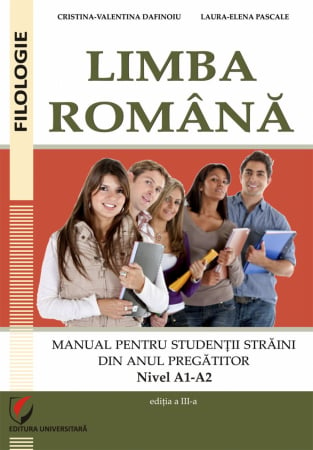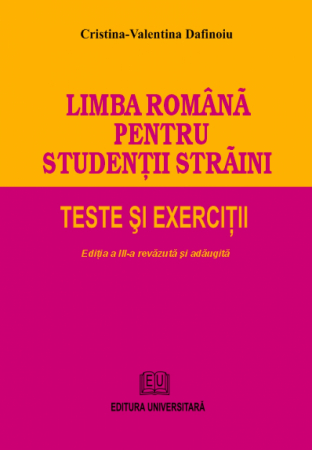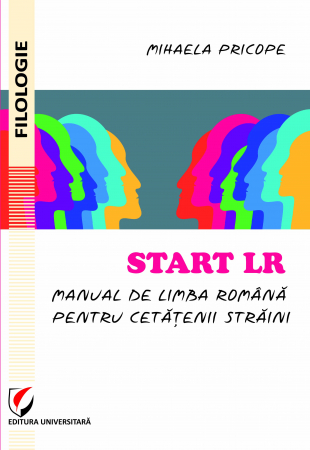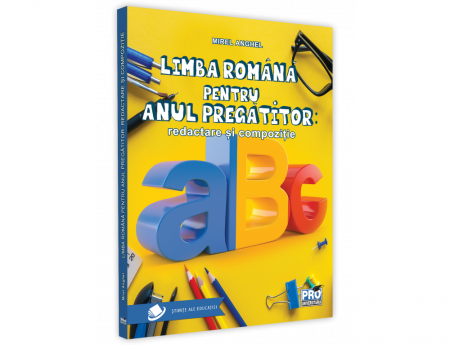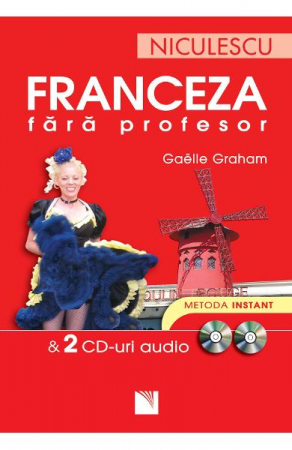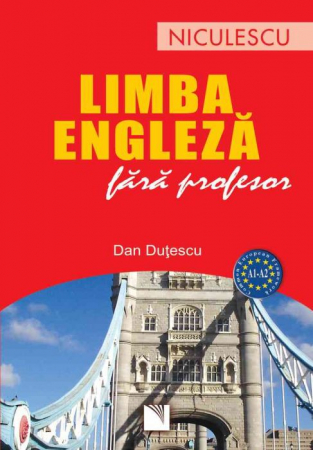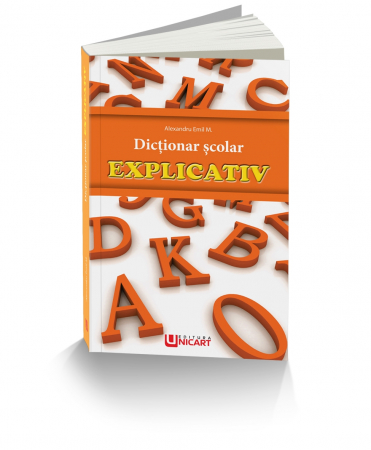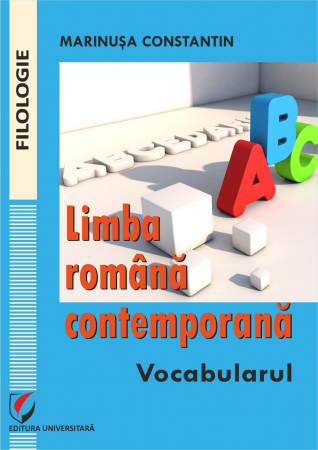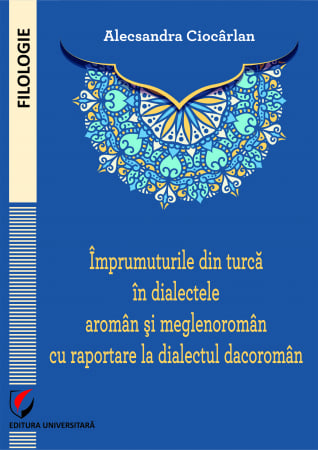Publisher: Editura Universitara
Author: Marina Cap-Bun, Angelo Mitchievici, Florentina Nicolae, Veronica Nedelcu
ISBN: 9786062811891
DOI: https://doi.org/10.568299786062811891
Publisher year: 2020
Edition: I
Pages: 474
- Description
- Download (1)
- Authors
- Content
- More details
- Where to find it
- Reviews (0)
As in the case of previous volumes, the texts selected here, which cover not only a diverse thematic and methodological area, but also geographical areas newly brought to the attention of STUR, have been subjected to specialized expertise by scientific references of the highest academic exigency. , to whom we thank, once again, for the support given to our project: Prof. univ. dr. Mircea Martin, University of Bucharest, corresponding member of the Romanian Academy; Prof. univ. Dr. Jozafina Komporaly, University of the Arts, London; Prof. univ. dr. Lacramioara Petrescu, "Alexandru Ioan Cuza" University of Iasi.
-
100 years of Romanian literature
Download
ANGELO MITCHIEVICI
FLORENTINA NICOLAE
VERONICA NEDELCU
Center for Research and Professional Development "Romanian Studies in an International Context" (STUR)
1. Atelier Matei Visniec / 11
Matei Visniec, Minodora (unpublished fragment from a novel in progress) / 13
Jozefina Komporaly, ‘Mr. K Released ’as Quarantine Literature: Confinement, Deferral, Liberation / 54
Marina Cap-Bun, The Last Survivor of Her Coronavirus About the Experience of Absolute Loneliness / 60
Mirela Mihaela Doga, Passing on illusions. The novel "Pas-parol" / 77
Simona-Nicoleta Minciu, „The merchant of the beginnings of the novel” by Matei Visniec - Interpretive germs / 89
2. 100 years of the novel / 99
Elena Ionescu, Conversions and mutual enlightenment / 101
Joan-María Jaime Moya, ‘God was born in exile’ in Spain / 110
Joan-Maria Jaime Moya, The poem ‘Cantecul gintei latine’ by Vasile Alecsandri and the Occitan translations, by F. Mistral, and Catalan, by J. M.ª de Garganta and Vila-Manyà / 114
Marius-Virgil Florea, A Foreigner in China / 123
Florentina Nicolae, Argumentative strategies in the “ghost” of the Cantemirian Hameleon / 135
Daniela Craciun, The Italian Novel Beyond Postmodernism: "Gomorrah" by Roberto Saviano / 144
Corina-Mihaela Apostoleanu, The Dobrogean space in four interwar literary paintings / 158
Olga Dutu, The magical realism from the novel "The distant light of the river" by Ovidiu Dunareanu / 169
Olga Dutu and Eugenia Vajiac, Constantin Novac, prose writer of the sea / 173
Olga Kaiter and Edith-Hilde Kaiter, Concerns of the Saxon writers from Transylvania for the Romanian folklore / 178
Florentina-Gabriela Rusu, Elements of discursive organization in the novel "The angel shouted" by Fanus Neagu / 190
Iulia-Magdalena Balan (Grecu), The novel and the canon. A relationship of over a century. Case study: Mihail Sadoveanu, Liviu Rebreanu, Camil Petrescu, G. Calinescu / 201
Mihaela Airinei, The double in the Sorescian creation / 216
Raluca Grigore, "Plain Raspberry", Mircea Nedelciu. The new Romanian flow / 226
Alina Anamaria Ganea, Mythical and symbolic structure in relation to the devil's intervention in the novel "Master and Margaret" / 239
Alice Maria Safta, "Flight over a cuckoo's nest" - transposition in actuality / 257
Robert-Andrei Stoica, The Secret Codes of Mircea Eliade's Literature. The sacred memory of the novel "Isabel and the waters of the devil" / 265
Alina Iftime, Aspects of the integration of literature in the Romanian language class as a foreign language of study / 285
Metacognition and Transdisciplinarity Research Center (M&T)
Adrian Tudurachi, What the author reads in the souls of the characters. The novel of interiority and the birth of the modern subject in Romanian culture / 299
Mircea Vasilescu, The Idea of Europe in the post-communist public discourse. The case of Romanian intellectuals / 314
Lacramioara Berechet, Psihanodia and the endless worlds of literary fiction. Vasile Voiculescu, Mircea Eliade, Mircea Cartarescu, three edifying readings / 331
Alina Buzatu, Feelings under the mask. Textual transvestites in „Micuta” by B. P. Hasdeu / 340
Angelo Mitchievici, The Absolute of Absolute Failure and Farewell Literature: "The Roulette" by Mircea Cartarescu / 348
Veronica Cristina Nedelcu, Spatial and temporal indices - elements of the (re) configurations of the Calinescian fictional space / 360
Sorin Mihai, The Great War between emotion and history / 368
Adriana (Dumitru) Moraru, The grammar of clothing and the body in the prose of Garabet Ibraileanu / 392
Ecaterina Alexandru, Novels for children and youth in the period of socialist realism / 408
Elena-Luminita Hritcu, The Aesthetic Recovery of the Orient in “The Phanariot Manuscript”, Doina Rusti's novel / 418
Clarisa (Cotici) Trandafirescu, To be or not to be a novelist - Mateiu I. Caragiale In interwar critical narratives / 429
Alin Pirosca, The two girls of seduction. A comparative analysis in Soren Kierkegaard and Camil Petrescu / 440
Ioana-Alina Costea, The novel of a geography of the surrealist imaginary “Nadja” by André Breton / 451
Data about authors (in alphabetical order) / 460
As in the case of previous volumes, the texts selected here, which cover not only a diverse thematic and methodological area, but also geographical areas newly brought to the attention of STUR, have been subjected to specialized expertise by scientific references of the highest academic exigency. , to whom we thank, once again, for the support given to our project: Prof. univ. dr. Mircea Martin, University of Bucharest, corresponding member of the Romanian Academy; Prof. univ. Dr. Jozafina Komporaly, University of the Arts, London; Prof. univ. dr. Lacramioara Petrescu, "Alexandru Ioan Cuza" University of Iasi.
A first part of the volume groups the contributions of the members and guests of the STUR Center and it contains, like the previous volumes, "Atelierul Matei Visniec", resulting from the research of the working group dedicated to the author, founded in 2014. This time we have the great honor to include in this section the unique fragment entitled Minodora, from a novel in the author's work, a new Romanian formula, in which postmodernist poetics becomes more flexible, leaving room for emotional realist-autobiographical accents. Also fascinating is the testimony of its English-language editor, Jozefina Komporaly, regarding the pandemic adventures of the novel Mr K Released, which could not be launched publicly as it should have been, due to the restrictions imposed by the coronavirus. To these are added studies dedicated to Visniecian novels, signed by Marina Cap-Bun, Mirela Mihaela Doga and Simona Nicoleta Minciu.
Another STUR section gathers various contributions dedicated to the novel, which covers multiple meridians. Assoc. Prof. Dr. Elena Ionescu from the University of Bucharest memorably evokes the moment of Cella Delavrancea's centenary, which she brings back to the spotlight, with her fascinating personality, but also with the cultural history of the century she crossed, synergistically reconstructed. Joan-María Jaime Moya, the only STUR member from Barcelona, delights us with two studies, one about exile (from Ovid to Vintila Horia) and the other about the unique interpretations of the Song of the Latin gens, the Alexandrian poem awarded in Montpellier, in Occitan and Catalan. Marius Virgil Florea, associate member of STUR and PhD student at Nanjing Normal University, China, offers us a completely unique exercise in comparativism, dealing with the fantastic literature of the Chinese writer Mo Yan (Nobel Prize winner) and that of Mircea Eliade, united by an archetypal binder of the collective subconscious. Florentina Nicolae decodes the argumentative strategies in the "ghost" of the Cantemirele Hameleon. Daniela Craciun investigates the Italian novel beyond postmodernism. Corina-Mihaela Apostoleanu, Olga Dutu and Eugenia Vajiac bring to attention representative Dobrogean writers of yesterday and today. Olga Kaiter and Edith-Hilde Kaiter interculturally complete the range of concerns reflected in our volume, commenting on the concerns of Saxon writers in Transylvania for Romanian folklore, and Alina Iftime, Romanian language lecturer in Ankara, points out aspects of the integration of Romanian literature as a language. foreign study. Also present in the summary are a series of young researchers, recently become doctors in philology, but also PhD students and masters: Florentina-Gabriela Rusu, Mihaela Airinei, Raluca Grigore, Iulia-Magdalena Balan (Grecu), Alina Anamaria Ganea, Alice Maria Safta and Robert-Andrei Stoica. The STUR Center is, programmatically, a framework for expressing their research.
The second part of the volume groups the contributions of the members and guests of the M&T Center. "The idea of Europe in post-communist public discourse. The case of Romanian intellectuals ”, the study proposed by Mircea Vasilescu from the University of Bucharest, although not directly aimed at the novel as a literary genre, provides the reference framework for the discussion on European validation of Romanian studies, difficult and retractable reconstruction of cultural bridges with Europe. the 1989 moment of detachment from the communist dictatorship. In his study, “What the author reads in the souls of the characters. The novel of interiority and the birth of the modern subject in Romanian culture ", Adrian Tudurachi, scientific secretary of the Institute of Linguistics and Literary History" Sextil Puscariu "from Cluj-Napoca, also keynote speaker of the conference, questions the Romanian novel from the perspective of the recall of interiority it occurs as a way of edifying the subject in modernity. The premise of this study that opens a wide field of research in the Romanian space is that the analysis of introspection, different from that of psychological analysis, discovers different reasons to probe interiorities, varied and nuanced dispositions of consciousness, several themes of social nonintegration.
In his study, “Psychodia and the Endless Worlds of Literary Fiction. Vasile Voiculescu, Mircea Eliade, Mircea Cartarescu, three edifying readings ", Lacramioara Berechet proposes for the relevant aesthetic analysis of the theme" psychoanalysis ", starting from the definition given by Ioan Petru Culianu in Experiences of ecstasy, as an expression of the restoration of the sacred on the horizon of the transcendent noticeable in the banal daily life, in a deranged Weberian world. Alina Buzatu proposes a reading of the novel in a parodic abbreviated formula, as a romantic sketch, through Bogdan Petriceu-Hasdeu's short story Micuta, able to ironically emphasize its mechanisms, techniques, stakes. In the study "Feelings under the mask. Angelo Mitchievici orients his text, "The Absolute of Absolute Failure and Farewell Literature: The Roulette by Mircea Cartarescu", to an existential theme, that of failure, but related to the postmodern aesthetics that Mircea Cartarescu adopts. In her study, Spatial and temporal indices - elements of the (re) configurations of the Calinescian fictional space, Veronica Nedelcu analyzes in detail the beginning of the Calinescian novel, Enigma Otiliei, from the perspective of the spatio-temporal indices that form a reading contract private. Sorin Mihai dedicates his study, "The Great War between emotion and history", to the novels that record the ideal idea of the First World War, from the perspective of how a new field of sensitivity is configured, that of the emotions of combatants faced with extraordinary situations, between which of imminent death is the common denominator. Adriana Moraru questions Garabet Ibraileanu's novel Adela from the perspective of capitalizing on femininity and its distinctive marks in "The Grammar of Clothing and the Body in Garabet Ibraileanu's Prose". "Novels for children and youth in the period of socialist realism", Ecaterina Alexandru's study, aims at deconstructing the initiatory scenarios, through a wide consultation of an impressed corpus accumulated next to a standard novel in the '50s, in order to recruit him for the cause. Elena-Luminita Hritcu makes an interesting analysis of the literary capitalization of the orientalizing imaginary through a subtle case study offered by Doina Rusti's novel in "The Aesthetic Recovery of the Orient in the Phanariot Manuscript, Doina Rusti's novel". In her text, "To be or not to be a novelist - Mateiu I. Caragiale in interwar critical narratives", Clarisa Trandafirescu is interested in critical metadiscourse, focusing the novel matein in the context of the interwar period and the discussion about the novel initiated then with a literary genre in obvious ascent. Alin Pirosca dedicates his essay, “The two girls of seduction. A comparative analysis of Soren Kierkegaard and Camil Petrescu ", a provocative topic, especially since it relates a novelist, Camil Petrescu, with philosophy studies, and his novel, The Last Night of Love, the First Night of War, with a philosopher who leans philosophy towards essay and intimate experience, Soren Kierkegaard with The Diary of the Seducer. "The novel of a geography of the surrealist imaginary Nadja - André Breton", Ioana-Alina Costea's study is dedicated to the novel of the most famous surrealist writer, André Breton, aiming at how the constitutive strategies of the surrealist discourse are incorporated in the novel's art.
We hope that this volume will also be a useful source of information, both for students, masters and doctoral students, as well as for the general public, already familiar with the study volumes of the STUR center.
Publishers
Customer Support Monday - Friday, between 8.00 - 16.00
0745 200 718 0745 200 357 comenzi@editurauniversitara.ro
6359.png)
![100 years of Romanian literature [1] 100 years of Romanian literature [1]](https://gomagcdn.ro/domains/editurauniversitara.ro/files/product/large/capbun-marina_100-ani-de-roman-romanesc_bt-3086-9531.jpg)
